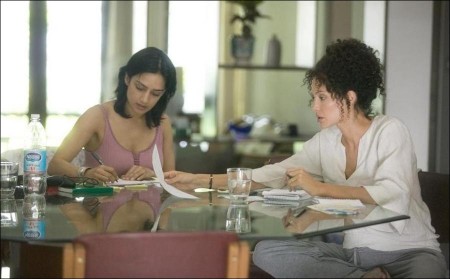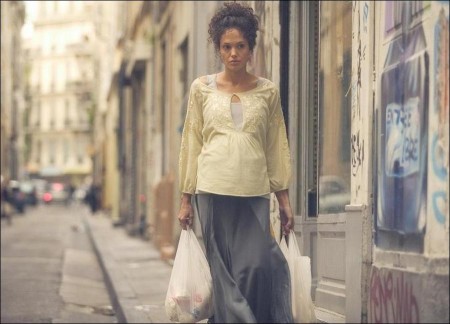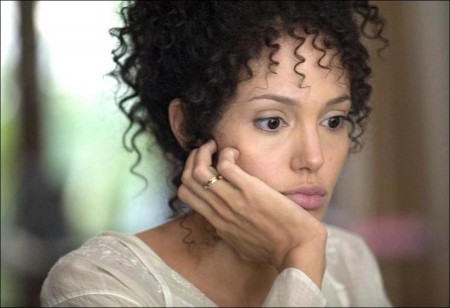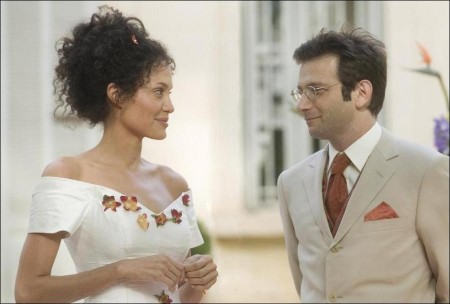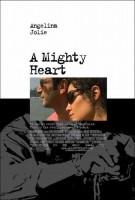In the 5 years since Daniel Pearl’s death, nearly 230 journalists have been killed in the line of duty. On January 23, 2002, Mariane Pearl’s world changed forever. Her husband Daniel, South Asia Bureau chief for the Wall Street Journal, was researching a story on shoe bomber Richard Reid. The story drew them to Karachi where a go-between had promised access to an elusive source. As Danny left for the meeting, he told Mariane he might be late for dinner. He never returned.
In the face of death, Danny’s spirit of defiance and his unflinching belief in the power of journalism led Mariane to write about his disappearance, the intense effort to find him and his eventual murderer in her memoir A Mighty Heart: The Brave Life and Death of My Husband Danny Pearl. Six months pregnant when the ordeal began, she was carrying a son that Danny hoped to name Adam.
She wrote the book to introduce Adam to the father he would never meet. Transcending religion, race and nationality, Mariane’s courageous desire to rise above the bitterness and hatred that continues to plague this post 9/11 world, serves as the purest expression of the joy of life she and Danny shared.
The night Danny disappeared, Mariane kept vigil with Asra Nomani, an old friend and colleague of Danny’s at the WSJ, living in Karachi. Both women were seasoned international journalists with formidable investigative skills, but they were also foreign women in a country that had become increasingly volatile since September 11. By dawn, they knew they were facing a crisis that required strong allies fully briefed on Pakistan’s proliferating terrorist cells, its byzantine bureaucracy and its notorious Inter-Services-Intelligence agency (I.S.I.).
Dozens of local investigators swarmed the house that morning, including a man called Captain, the then head of Pakistan’s brand new counter-terrorism unit. With Asra’s house as headquarters, Captain’s men, along with an American diplomatic security agent, two Journal colleagues and the FBI, dedicated themselves to the search.
After five harrowing weeks, amidst escalating media frenzy, they found the kidnappers. Among them was the known militant Omar Saeed Sheikh, aka “Bashir,” the go-between who had offered Danny information relating to the shoe bomber story. Then came the devastating news that Danny had been brutally murdered weeks earlier.
Mariane and Danny believed that by bearing witness to events and allowing all voices to be heard, truthful journalism could bridge communities in conflict. Mariane has remained devoted to this principle, refusing to succumb to hate or fear. After Danny’s death, she went home to her native France to await Adam’s birth. She and Adam now live in Paris, France.
Sharing a Story
A Mighty Heart was filmed in India, France and Pakistan, during the summer and fall of 2006. Its journey to the screen began three years earlier when Plan B Entertainment acquired the rights to Mariane Pearl’s memoir (co-written with Sarah Crichton).
“Brad’s interest in the book was inspired by Mariane’s tremendous courage, and the generosity with which she shares her story,” said producer Dede Gardner, Producer at Plan B. “The process with Mariane from the beginning was driven by mutual respect. We were very conscious that a movie without her input and approval wouldn’t be worth making.”
Pearl’s feedback was sought on the screenplay and on potential directors. “We sent her films to watch and had many discussions about the qualities that we all felt were crucial to our choice of director,” said Gardner.
Michael Winterbottom began making documentaries in England in the late 1980’s and moved into dramatic features a few years later. With his 1997 film Welcome to Sarajevo, he began shooting dramatic stories in documentary style. To heighten the sense of reality and truth, he kept his crews lean and unobtrusive, and encouraged his actors to improvise. His preferred subjects, from the political docudrama The Road to Guantanamo to the lighter but still provocative 24 Hour Party People, were well-suited to this approach.
A Winterbottom fan since Welcome to Sarajevo, Gardner gave the prolific director Mariane Pearl’s book at a London meeting in 2004. He was intrigued. “I was in Pakistan in 2001 when Daniel and Mariane were covering the war in Afghanistan,” he said. “We were filming In This World in Peshawar when we heard about Danny’s death. So I had my own experience of Pakistan when I read Mariane’s book, and I was impressed. It seemed very recognizable.”
By early 2006, he had completed two more films, including The Road to Guantanamo (which also filmed in Pakistan, as well as Afghanistan, Iran, Cuba and Britain). That film convinced Pitt that Winterbottom should direct A Mighty Heart.
“Brad called and we talked about the book and his ideas about how the film should be,” said Winterbottom. “Then I went to Paris to meet Mariane, and finally, in May, Andrew, Mariane, Dede and I went down to Namibia to meet up with Brad and Angie. That was the first time I met Angelina and it was great to see her with Mariane. They were very close and very similar – straight-forward and easy to deal with. Our conversations were practical. We talked about what should and shouldn’t be in the film.”
Still, she did worry about taking on A Mighty Heart. “Mariane has suffered the ugliest side of all that is going on in the world today and came out of it believing we cannot just be angry and blinded by hate, but must continue to have a dialogue,” said Jolie. “If I don’t represent her right, and people don’t see what a beautiful, strong, open-minded, loving woman she is, then I’ve done a disservice and hurt a really great woman.”
Pearl wasn’t worried. “I am delighted that Angelina Jolie is playing my role in the adaptation of my book,” she said. “I deeply admire her work and what she is committed to. I am also happy that Michael Winterbottom, a versatile and talented director who genuinely loves truth, is working on this project.”
Winterbottom used Mariane Pearl’s book as his bible in structuring the film. “We started by following her descriptions of events,” said Winterbottom. “Then I tried to meet with everyone who was with her at the time – Asra, Captain, Randall Bennett and his deputy Zahoor, Dost, John Bussey, Steve LeVine, Asif (Danny’s translator and fixer in Islamabad) and Jameel Yusuf of the Citizens Police Liaison Committee (CPLC). Each meeting added extra details to the story.”
As he cast the film, Winterbottom also asked his actors to meet with the people they would play. For Dan Futterman, that meant the people closest to Daniel Pearl, personally and professionally.
Futterman was grateful for the access, especially to Mariane. “We met in Los Angeles, where she still brings her son to visit Daniel’s parents,” said Futterman. “In what must have been a painful meeting for her, she was concerned only with making me feel comfortable, and with giving me information about Daniel, his work, family, and their relationship. We spoke and emailed repeatedly after that, and she visited all of us in France in the days before we began shooting there.”
Futterman found other sources helpful, too. “Asra Nomani was very informative about the Wall Street Journal, Pakistan and the work of journalism in general,” he continued. “Steve LeVine spoke with me extensively about the investigative work he did with Daniel in that part of the world. Daniel’s fixer in Islamabad, Asif, sat with me while we filmed in that city, to talk about working with Daniel. And Daniel’s parents, Ruth and Judea, were encouraging, informative and very generous.”
Keeping It Real
“I don’t think it would have been possible to make A Mighty Heart without filming in Pakistan,” said Winterbottom. “The whole point of making the film would be lost. We want the audience to trust that they are seeing an accurate account of what happened.”
Pakistan is a challenging environment for filmmakers, as Winterbottom and producer Andrew Eaton learned in 2001 while shooting In This World. “It wasn’t a pleasant time to be there,” said Eaton. “There was a real fear among Pakistan authorities for the safety of Western people working there.”
Eaton knew the pitfalls as he began the process of obtaining official permissions for A Mighty Heart. “Our best ally was Kamal Shah, Secretary of the Interior Ministry,” said the veteran producer. “Shah was head of Sindh (state) police in Karachi when Danny was kidnapped. He understood what the film was trying to do, and felt the portrayal of the collaboration between Pakistan and U.S. authorities ultimately shed a good light on Pakistan.”
The Pakistani actors agreed. “When you read the script and the book, you see a very fair representation in terms of the people who were helping,” said Mikail Lotia, who plays Captain’s young computer expert. “I felt it was worth trying to bring that across on screen.”
Principal photography began with filming in Karachi, Islamabad and Rawalpindi, on the cusp of monsoon season. “We filmed on the streets and in the real locations that Danny went to – the Village Restaurant where he was to meet Imitaz Siddique, the CPLC offices, Cybernet and the Hotel Akbar where he met Bashir,” said Winterbottom. “We stayed at the Sheraton in Karachi (as John Bussey and Steve LeVine did during the search for Daniel Pearl).”
India would serve as the setting for Asra Nomani’s house, the story’s central location. Danny and Mariane stayed there when they visited Karachi, and later, the team searching for Danny made it their headquarters. The house for the film was found in a community called Sindh Society in the city of Pune, home to many Pakistanis. The production spent five weeks at the Pune house, before moving west to Mumbai for several more weeks of work.
Like Karachi, Mumbai is a teeming city on the Arabian Sea. Irrfan Khan, the quietly intense Indian actor who plays Captain, was on his home turf there. “He had as many people chasing after him in Mumbai as Angelina did,” said Winterbottom. The company filmed at iconic landmarks including the Gateway of India and Churchgate Station, as well as at local madrassas, a morgue, and a maternity ward. Street scenes ranged from police raids to an ecstatic Ganesh procession.
Filming in all locations proceeded in typical Winterbottom style: director of photography Marcel Zyskind, who has worked on seven films with Winterbottom, operated a hand-held DV camera. There were no rehearsals, and no master shots or attendant series of close-ups. Most takes ran the full length of a scene, and scenes were shot in sequence. Winterbottom didn’t call “action” or tell anyone where the camera would be. That was decided in the moment, sometimes with Winterbottom gripping the back of Zyskind’s shirt to steer him. Natural light was used whenever possible to allow actors and camera freedom of movement.
“Michael creates an environment which feels as little like a movie set as possible,” said Futterman. “He’s looking, I think, for those surprising and unscripted moments of authenticity.”
Winterbottom asked the actors to treat the script’s dialogue as a starting point and improvise as much as possible. “They have spent time with the real characters, so they have heard how they talk. They know details of their personal stories and their points of view on these events,” he said. “We try to shoot the whole scene as it would naturally happen, and we shoot the entire scene on each take to allow a natural rhythm to develop. The scene can then change and evolve with each performance.”
Improvising within the framework of complicated and sensitive facts kept everyone on their toes. “We’re playing journalists, so we’re always discussing facts,” said Archie Panjabi, the Indian-born British actress who plays Asra, and previously worked with Winterbottom on Code 46. “Just the number of names and people and aliases and organizations involved in the case made it incredibly challenging – especially when you don’t know what the other actors are going to say.”
It paid off. “It felt like we were really in these moments together, and shooting the scenes in order made it much more real for us,” said Jolie.
Jolie’s transformation added another layer of authenticity, and put American actor Gary Wilmes in the right mood on his first day as reporter Steve LeVine. “I hadn’t met Angelina yet, so I walked into Asra’s house for the first time as Steve did in real life,” he recalled. “I had never seen her without the wig, and felt much more that I was with Mariane than with Angelina.”
Before coming to India, A Mighty Heart visited the south of France for scenes including Danny and Mariane’s wedding, at Chateau de Valmousse in Lambesc. Futterman had already filmed in Pakistan, but the wedding day was Jolie’s first on set.
“The way Michael shoots, I had no rehearsal,” said Jolie. “I was in my room getting ready and they said, `Okay, come down the stairs.’ So that was it. I walked into the wedding and we said our vows. I had looked at Danny’s and Mariane’s wedding footage just before, and it made me terribly sad. It was such a happy moment for her, so beautiful. They loved each other so much, those two, and you can see it in the wedding. It was hard not to cry.”
The day after the wedding sequence, Jolie was filmed on the street in Marseilles, portraying Mariane after she has left Karachi to await her son’s birth. “She was walking down the street heavily pregnant, in a long gray skirt, carrying two shopping bags,” Walter recalled. “People walked past her, and bumped into her, and nobody recognized her. It was quite amazing.”
A Connected Group
While highly regarded actors filled A MIGHTY HEART’S principal roles from the U.S., England, India and Pakistan, many small roles went to non-actors, mostly from Pakistan. “There’s not a big acting community in Pakistan,” said Wendy Brazington (24 Hour Party People), Winterbottom’s casting director since 1997. “So if a guy on the street looked right for the part, we grabbed him.”
Visa hassles aside, Winterbottom was keen on bringing people from Pakistan to India, for the authenticity they contributed, and to expand their horizons. “People like the taxi drivers or Shabir (Asra’s houseman) had never been on a plane before, or outside Pakistan,” he said. “Our real fixer from Islamabad played the fixer Masud, and our fixer from Peshawar on In This World came to India and played an I.S.I. officer.”
Karachi travel agent Telal Saeed was uniquely qualified to play `Kaleem,’ the character based on Jameel Yusuf. Yusuf heads CPLC, formed in 1989 by Karachi industrialists to recover kidnap victims. Saeed knew him socially, and then professionally when his own nephew was kidnapped and held for 91 days. “CPLC has state of the art equipment, computerized for surveillance, especially for monitoring phone calls,” said Saeed. “The FBI was surprised to see their set-up and coordinated with them on the Daniel Pearl case.”
Saeed’s brother Bilal, a hotelier and father of the kidnapped boy, was cast as interior minister Moinuddin Haider.
“It was a very connected group,” said Jolie. “I didn’t even know who was a non-actor because it all just felt right.”
It felt right behind the camera, too, where Winterbottom’s long-standing team worked alongside Indian and Pakistani crew members. “What was really great was that Dede and Plan B, and especially Angie, were so relaxed and friendly, that all these people with completely different experiences just got on with it,” said Winterbottom.
Jolie understood the potential for risk, and for reward. “We talked about the risks before we started filming, the security concerns and what it would mean politically if we got it wrong. We could anger more people and make it worse,” she said. “But if by some small chance we get it right, maybe we can do a little something towards bringing people back together, or at least looking at each other in another light.”
Production notes provided by Paramount Vantage.
A Mighty Heart
Starring: Angelina Jolie, Dan Futterman, Sajid Hasan, Aly Khan, Irfan Khan, Denis O’Hare, Archie Panjabi, Will Patton
Directed by: Michael Winterbottom
Screenplay by: Michael Winterbottom
Release Date: June 22th, 2007
Running Time: 108 minutes
MPAA Rating: R for language.
Studio: Paramount Vantage
Box Office Totals
Domestic: $9,176,787 (48.5%)
Foreign: $9,757,784 (51.5%)
Total: $18,934,571 (Worldwide)
